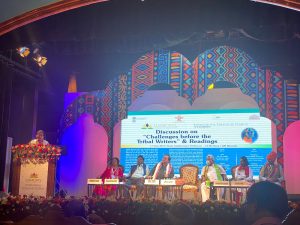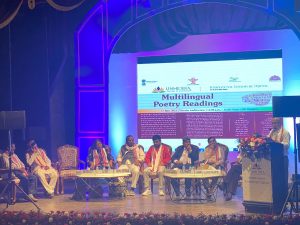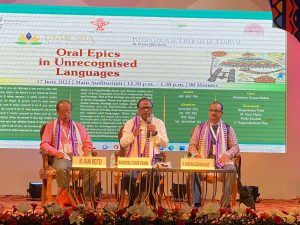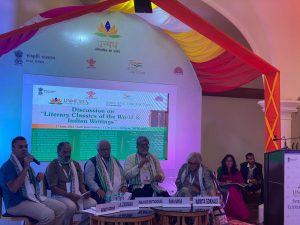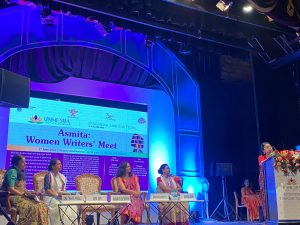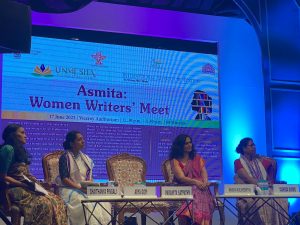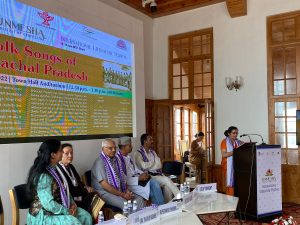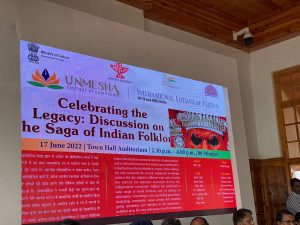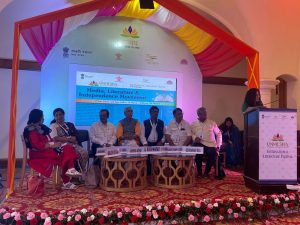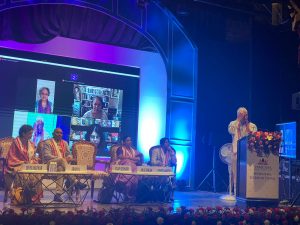
Day two of UNMESHA was quite vibrant; full of discussions and readings which introduced and enriched the knowledge of the participants and audiences commendably. Twenty-four events took place during the day followed by a cultural evening.
 A discussion on Challenges Before the Tribal Writers & Readings was chaired by Anil Boro and the discussants and languages adopted in writings were by Jayanta Rongpi, Assamese, Madan Mohan Soren, Santali, Streamlet Dkhar, Khasi; readings were by Chandrakant Murasingh, Kokborok, Jogmaya Chakma, Chakma, Tukaram Dhande, Mahadev Koli, and Urmila Kure, Gondi. Artists from all over the country who represented their culture through literary mediums such as poems and short stories shared similar views regarding the main intention of carrying on their works in their native languages such as Gondi, Assamese, Khasi etc., the thought of preserving their culture, traditions, customs, and lifestyle is very essential. The aspects mentioned earlier are being forgotten at a fast rate by the ongoing and future generations causing the cultures to be forgotten. The rate of depletion of many tribal cultures is very harmful to the ecosystem of our country where diversity is valued greatly thus we should be educated about the various cultures present in India and the session discussed the beautiful poetry and stories of many individuals and their cultures which are full of vivid ideas and experiences of their societies, was up for discussion.
A discussion on Challenges Before the Tribal Writers & Readings was chaired by Anil Boro and the discussants and languages adopted in writings were by Jayanta Rongpi, Assamese, Madan Mohan Soren, Santali, Streamlet Dkhar, Khasi; readings were by Chandrakant Murasingh, Kokborok, Jogmaya Chakma, Chakma, Tukaram Dhande, Mahadev Koli, and Urmila Kure, Gondi. Artists from all over the country who represented their culture through literary mediums such as poems and short stories shared similar views regarding the main intention of carrying on their works in their native languages such as Gondi, Assamese, Khasi etc., the thought of preserving their culture, traditions, customs, and lifestyle is very essential. The aspects mentioned earlier are being forgotten at a fast rate by the ongoing and future generations causing the cultures to be forgotten. The rate of depletion of many tribal cultures is very harmful to the ecosystem of our country where diversity is valued greatly thus we should be educated about the various cultures present in India and the session discussed the beautiful poetry and stories of many individuals and their cultures which are full of vivid ideas and experiences of their societies, was up for discussion.
Oral Epics in Unrecognised Languages was chaired by Mahendra Kumar Mishra and the participants were Bhagwandas Patel M., Mani Meitei, Molly Kaushal and S. Nagamalleshwar Rao, whose knowledge provided great insight into the oral epics which are indigenous to their cultures. From the different stories of Ramayana in Imphal to the stories of Raj Gonds which have no connections to the world epics such as Mahabharata, have stories of their own which are very intriguing. The session explained the symbiotic relationship that the unrecognised languages have with nationally known epics as many stories have a differently understood version of these popular stories. The existence of these epics and their indigenous versions have influenced the societies greatly, so much that people’s religious choices have been impacted by these stories. The unrecognised languages have been existing for as long as our history of Mahabharata and Ramayana which proves the rich literature these communities have, instead of penning down the language it is passed on to generations through oral teachings. These local epics are usually unknown to the larger public because of the lack of representation and recognition, but that doesn’t mean these epics are non-existent. Such sessions attempt to show the unique diversities present across the country.

 Discussion on Asmita: Women Writers’ Meet was chaired by Paramita Satpathy and the participants were Arya Gopi, Malayalam; Chaithanya Pingali, Telugu; Manisha Kulshreshtha, Hindi; Yashoda Murmu, Santali. The writers expressed their views about women’s involvement in literature and the progress women can achieve through literary endeavours. They shared that they use their female acquaintances and daily environment as inspiration for their writing. Some of the panellists discussed the difficulties they have come across during their journey as writers and the discrimination they faced in the industry and life. The brighter side is that the life of women has improved significantly, though, it is far from becoming equal they believe society has come a long way. The evolution of writing by women is the very evidence of social and behavioural changes that women have experienced, if we were to compare the writings of the present to the past, the narratives have evolved in the favour of women. Now women are an entity that needs to be not just an object or nurturers of families but a community that is empowered and at par with fellow genders.
Discussion on Asmita: Women Writers’ Meet was chaired by Paramita Satpathy and the participants were Arya Gopi, Malayalam; Chaithanya Pingali, Telugu; Manisha Kulshreshtha, Hindi; Yashoda Murmu, Santali. The writers expressed their views about women’s involvement in literature and the progress women can achieve through literary endeavours. They shared that they use their female acquaintances and daily environment as inspiration for their writing. Some of the panellists discussed the difficulties they have come across during their journey as writers and the discrimination they faced in the industry and life. The brighter side is that the life of women has improved significantly, though, it is far from becoming equal they believe society has come a long way. The evolution of writing by women is the very evidence of social and behavioural changes that women have experienced, if we were to compare the writings of the present to the past, the narratives have evolved in the favour of women. Now women are an entity that needs to be not just an object or nurturers of families but a community that is empowered and at par with fellow genders.

A discussion on Indian Diaspora: Literary Expressions was chaired by Vijay Seshadri from USA and participants were Abhay K., Madagascar; Anju Ranjan, South Africa; Chita Banerjee Divakaruni, USA; Divya Mathur, UK; Manjula Padmanabhan, USA; Pushpita Awasthy, Netherlands; Sunetra Gupta, UK; Suresh Chandra Shukla, Norway. To explain what Indian diaspora means the popular phrase “you find the Indian in every country” would be suitable. India is a country with the largest diaspora and it is said that it will be increasing its numbers as the years pass by and the rate has been quite frightening. The Indian citizens or individuals who had Indian origins were involved in the session and they expressed how literature has evolved for them as they have been part of two or more cultures. One that is migrating from India is not only exposed to the literacy and geographical changes but also the lifestyle of an individual is completely transformed, they are exposed to a new environment which has its own functioning systems and rules. These rules and functions exist because of the literature and history of the region are so different. The writers expressed their views, experiences and longing for India in their writings. They mentioned that the need to write about the country is there not only because they long for it, but it felt that many individuals are in the same boat as them and share a similar feeling of loneliness and love for the nation. Some tales of bittersweet, some are fun-loving and some are critical. The genres under which the writings have been published are as diverse as India, proving that many different types of Indians have migrated and settled in foreign societies.


